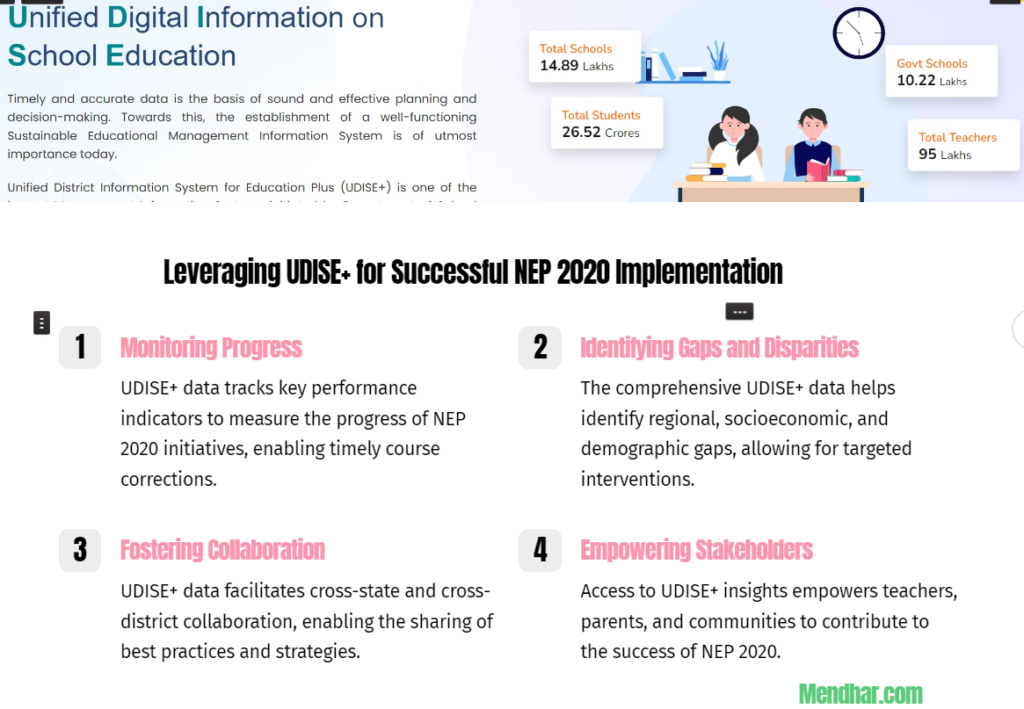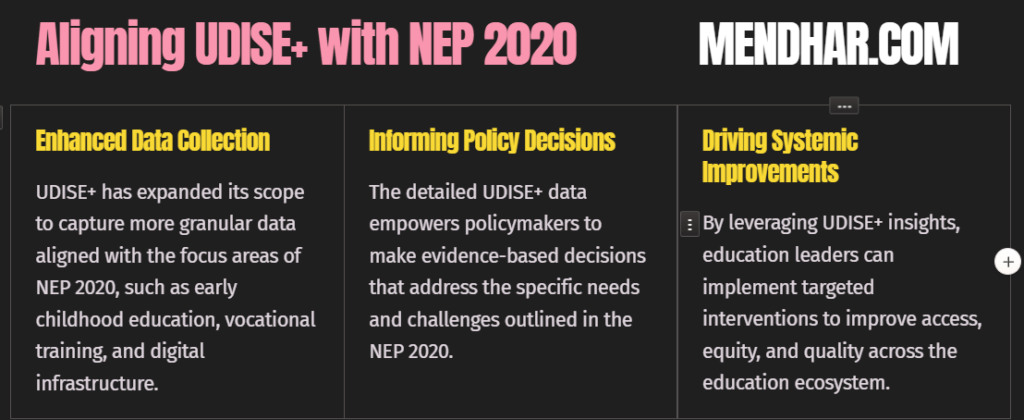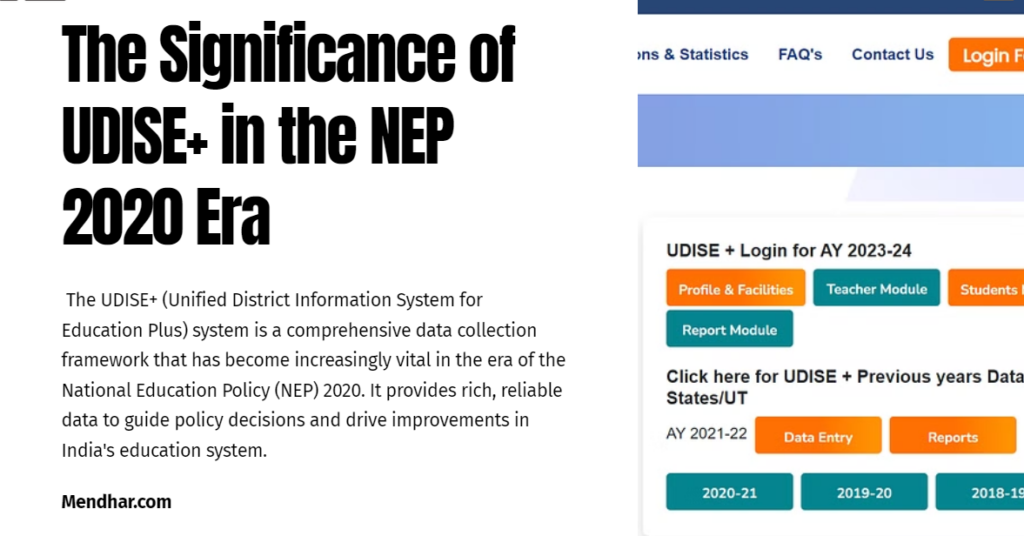Table of Contents
ToggleUnderstanding the Significance of UDISE+ in the NEP 2020 Era

That sounds like a compelling topic! UDISE+ indeed plays a vital role in the implementation of the NEP 2020 in India. It serves as a comprehensive data collection and management system for education-related information at the district level, offering insights crucial for policy formulation and decision-making.
The need for UDISE+ arises from the necessity to have accurate and up-to-date data about various aspects of the education system, including enrollment, infrastructure, teacher availability, and learning outcomes. Such data is essential for identifying gaps, formulating targeted interventions, and monitoring the progress of educational initiatives.
Importantly, UDISE+ aligns with the vision of NEP 2020, which emphasizes the use of technology and data-driven approaches to enhance the quality and inclusivity of education. By providing a unified platform for data collection, analysis, and reporting, UDISE+ facilitates evidence-based policy-making and enables stakeholders to track the implementation of key educational reforms outlined in the NEP.
The Need for UDISE+ in the NEP 2020 Era:
Data-Driven Decision Making: With NEP 2020 emphasizing the importance of data-driven decision-making at all levels of the education system, UDISE+ emerges as a crucial tool. It provides policymakers, educators, and stakeholders with real-time, reliable data to formulate informed strategies and policies.
Monitoring Progress and Accountability: The NEP 2020 lays significant emphasis on monitoring progress and ensuring accountability in the education sector. UDISE+ facilitates continuous monitoring of various parameters such as enrollment rates, infrastructure availability, teacher-student ratios, and learning outcomes, enabling stakeholders to track progress and identify areas needing attention.
Targeted Interventions: By providing granular data at the district, state, and national levels, UDISE+ enables targeted interventions to address specific challenges and gaps in the education system. Whether it’s improving infrastructure, enhancing teacher training programs, or bridging learning gaps, UDISE+ empowers policymakers to tailor interventions according to the needs of different regions and demographics.
Ensuring Equity and Inclusion: NEP 2020 advocates for an inclusive and equitable education system that caters to the diverse needs of all learners. UDISE+ plays a pivotal role in this regard by capturing data related to enrollment rates, dropout rates, and the provision of facilities for marginalized communities. This data serves as a basis for formulating policies and initiatives aimed at ensuring equitable access to quality education for all.

Importance of UDISE+ Features in the NEP 2020 Context:
Comprehensive Data Collection: UDISE+ collects a wide array of data ranging from student demographics and enrollment figures to infrastructure facilities and teacher qualifications. This comprehensive dataset aligns with the multifaceted approach advocated by NEP 2020, enabling holistic planning and decision-making.
Real-Time Monitoring: In line with the NEP’s emphasis on continuous monitoring and evaluation, UDISE+ provides real-time data updates, allowing stakeholders to promptly identify emerging trends, challenges, and opportunities. This timely feedback mechanism enables agile decision-making and swift course corrections, contributing to the overall effectiveness of education policies and programs.
Interoperability and Integration: NEP 2020 envisions a seamless and integrated education system that transcends silos and fosters collaboration across different stakeholders. UDISE+ supports this vision by promoting interoperability and data integration across various education-related databases and platforms. This interoperability enhances data accuracy, consistency, and accessibility, facilitating cohesive planning and implementation efforts.
Evidence-Based Policy Formulation: By offering robust data analytics and reporting capabilities, UDISE+ empowers policymakers to formulate evidence-based policies aligned with the objectives of NEP 2020. Whether it’s devising strategies to improve learning outcomes, enhance teacher quality, or promote digital literacy, UDISE+ serves as a repository of actionable insights, guiding policymakers towards informed decision-making.
Challenges and Future Prospects:
While UDISE+ holds immense potential in advancing the goals of NEP 2020, several challenges need to be addressed to realize its full impact. These include ensuring data accuracy and reliability, promoting data literacy among stakeholders, enhancing technical infrastructure, and fostering a culture of data-driven decision-making.
Looking ahead, the integration of emerging technologies such as artificial intelligence (AI) and machine learning (ML) could further enhance the capabilities of UDISE+ by enabling predictive analytics, personalized interventions, and adaptive learning solutions. Moreover, fostering partnerships with academia, industry, and civil society can leverage expertise and resources to address complex challenges and drive innovation in education data management and analysis.
Conclusion:
In the transformative journey outlined by NEP 2020, UDISE+ emerges as a cornerstone for building a data-driven, inclusive, and equitable education system. By harnessing the power of data and technology, UDISE+ empowers stakeholders to monitor progress, identify challenges, and formulate evidence-based policies tailored to the diverse needs of learners. As India strides towards realizing the vision of a knowledge-based society, UDISE+ stands as a testament to the potential of data-driven innovation in shaping the future of education.

Frequently Asked Questions about UDISE+
1. What is UDISE+?
- UDISE+ stands for Unified District Information System for Education Plus. It is a comprehensive database launched by the Ministry of Education, Government of India, to collect, analyze, and disseminate data related to school education across the country.
2. What is the objective of UDISE+?
- The primary objective of UDISE+ is to provide policymakers, educators, and stakeholders with accurate and real-time data to facilitate evidence-based decision-making and policy formulation in the education sector.
3. How does UDISE+ contribute to the goals of the National Education Policy (NEP) 2020?
- UDISE+ aligns with the objectives of NEP 2020 by promoting data-driven decision-making, monitoring progress, ensuring accountability, targeting interventions, and fostering equity and inclusion in the education system.
4. What kind of data does UDISE+ collect?
- UDISE+ collects a wide range of data including student enrollment figures, demographic information, infrastructure facilities in schools, teacher qualifications, learning outcomes, and other relevant indicators across different levels of education.
5. How is UDISE+ data used?
- UDISE+ data is used by policymakers to monitor progress, identify challenges, and formulate evidence-based policies and interventions aimed at improving the quality, accessibility, and inclusivity of education across various regions and demographics.
6. Is UDISE+ accessible to the public?
- While UDISE+ primarily serves as a platform for policymakers and stakeholders, certain aggregated data and reports may be made accessible to the public through official channels and publications.



